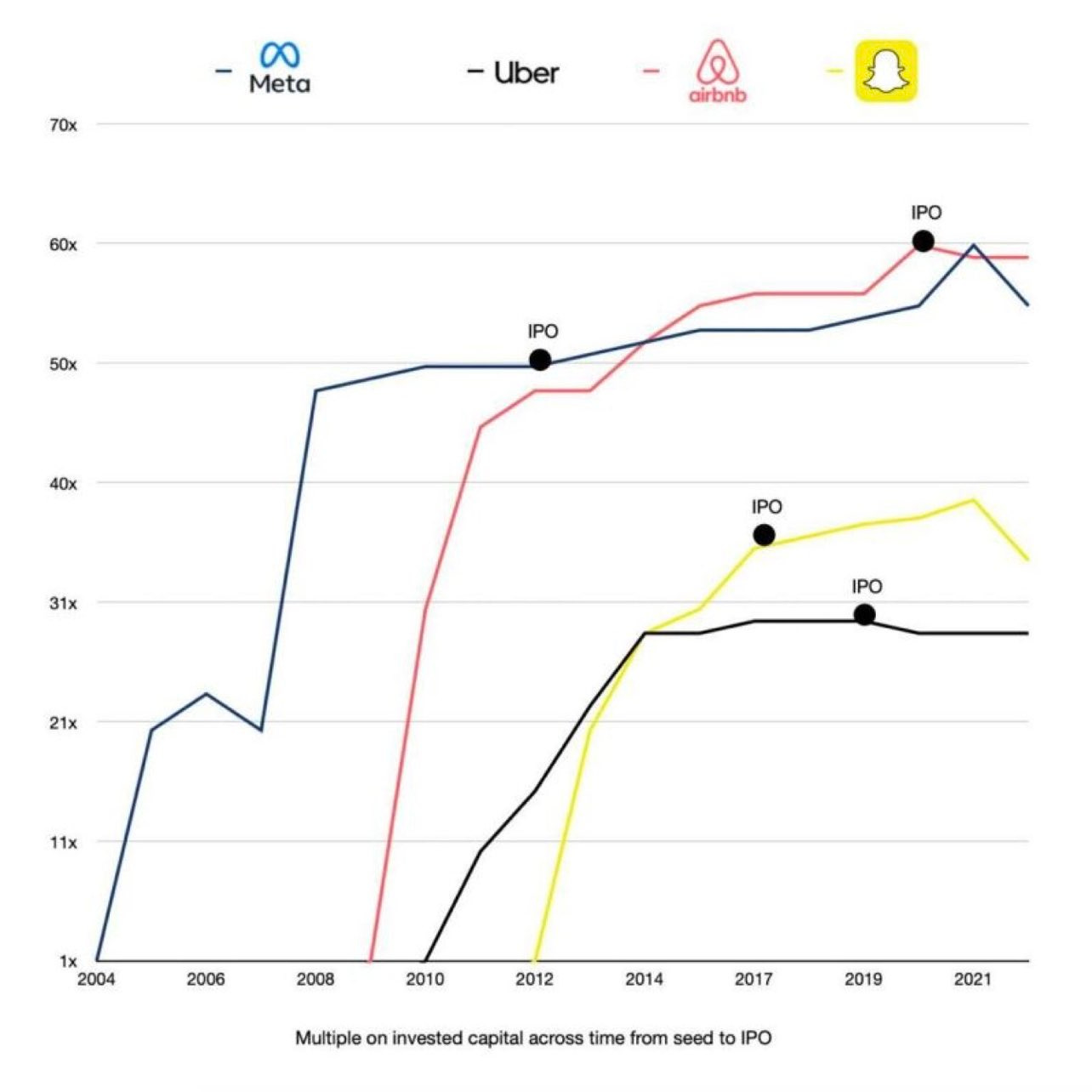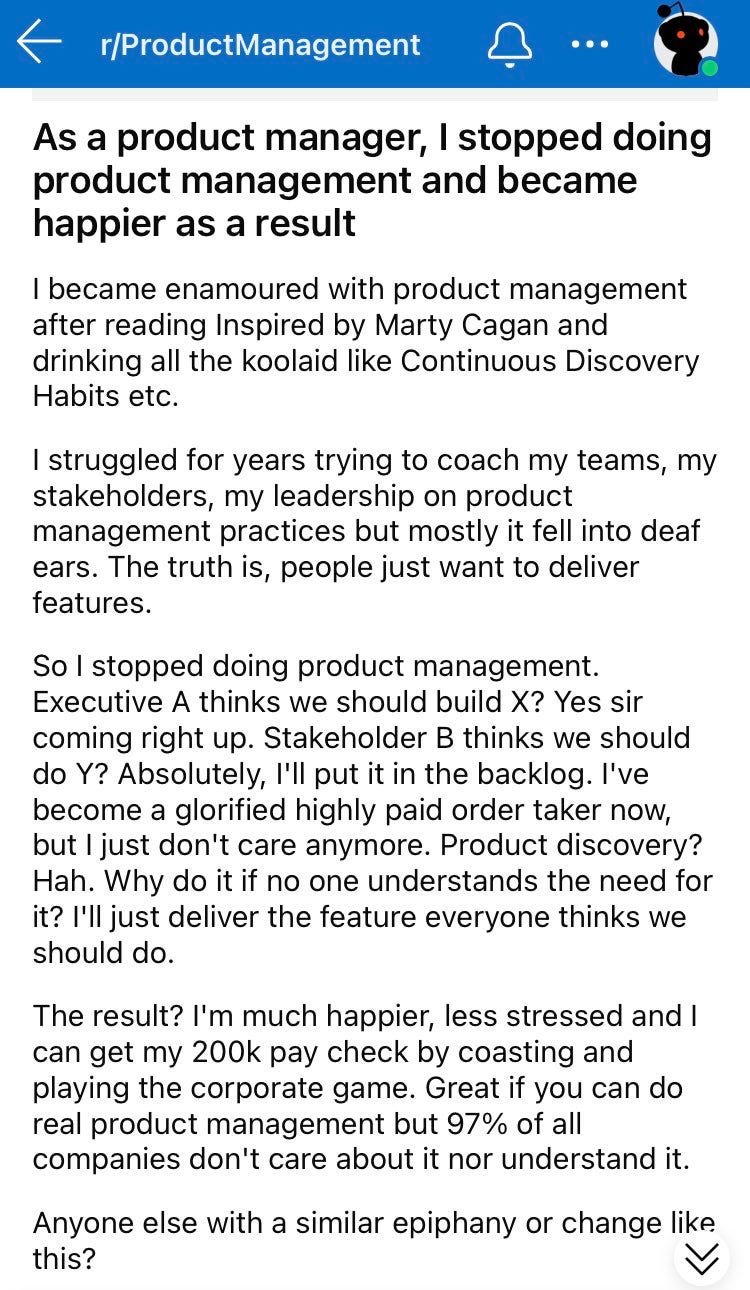Meta, Uber, Airbnb, and Snap IPO Returns
+ Don’t be Enamored with Textbook PM
What do Meta, Uber, Airbnb, and Snap have in common?
IPO investors haven’t done very well:
What’s going on?
1. Companies are staying private longer than ever
All 4 of these companies were darlings of Silicon Valley before they went public. They stayed private while famous:
SNAP: 6 years
META: 8 years
UBER: 10 years
ABNB: 12 years
This left the returns to private market investors. The big name tech companies used to IPO sooner:
Netflix: 5 years
Apple: 4 years
Amazon: 3 years
Yahoo: 2 years
Netscape: 2 years
This left time for public market investors to capture some of the returns.
2. VCs are identifying and capturing the opportunity
Part of the reason these companies could stay private for so long is they were richly funded by VCs. They didn’t need to go public and face the scrutiny of quarterly earnings. VCs are swooping in and capturing the upside. The earliest investors did very well:
ABNB: 60x
META: 50x
SNAP: 35x
UBER: 30x
With VCs able to capture so much of the upside, there is very little left for public market investors.
Much of this is reflected in IPO valuations. They have been trending higher. Amazon IPO’d at a $438M valuation. That’s why public markets could >1000x their returns. Apple IPO’d at $1.8B. These 4 were much higher:
META: $104B
ABNB: $87B
UBER: $75B
SNAP: $23B
Big IPOs have harder times growing from there.
3. Profits aren’t broadly kicking in at these companies yet
Outside of META, these companies have had a hangover from their VC funded days. They still have “spend big, grow big” cultures that are only now just turning around.
Private market investors reward revenue growth. Public markets reward earnings growth. This focus on profitability has been tough for these companies.
META: continues to feel insecure about its social media future and is investing in the metaverse
ABNB: has just turned the corner towards profitability but lags hotel peers
UBER: is finally turning the corner but has been slow to the party
SNAP: has managed to still be unprofitable as it continues to spend big
All 4 companies have their own problems. But the overall lack of growing profits is their biggest struggle with public markets.
Google, Microsoft and Apple keep growing profits. This is what makes them public market darlings. For public market investors to get 10x returns, these 4 have to get that trillion-dollar big.
Time will tell whether they can change their ways.
Don’t be Enamored with Textbook PM
Being enamored with “textbook” product management is the easiest way to unhappiness and burnout. Case in point - this anonymous Reddit post:
Instead:
Accept the job
Slowly change things
Love trudging in the muck
Throw away the textbooks
1. Accept the job
The sentiment expressed in this reddit post is by far the most common cause of PM angst. PMs get on the Inspired/ Continuous Discovery train. They find their current workplaces lacking that problem discovery empowerment, and complain.
A much gentler mental approach is to accept the bad with the good. It’s a state of zen about work. Recognize that every PM has to make compromises from the ideal. It might be a process, or it might be a teammate, or it might be a boss. Every situation has its ups & downs.
2. Slowly change things
Product leadership likely understands the gaps too. Often, they too are struggling with how to have more control of the roadmap, more product strategy. Working with them to slowly improve the product culture is a much more productive use of energy.
It has two big benefits:
It gives you the satisfaction of “doing something.”
It helps you become a positive leadership change agent.
Suddenly, instead of wallowing in your situation, you are the person pushing the whole org to be better.
3. Love trudging in the muck
“The muck” is the grey area and dirty work of PM. It involves negotiation with executives and stakeholders. But, instead of saying yes all the time like our Reddit poster, it requires persuasion and credibility.
On one end, you could become an order taker. But a much more impressive and impactful route is to take on the negotiations. When people come to you with a feature idea, help them understand the data and user problems. Then potentially update your roadmap. But often, don’t.
It’s more about the process of coming to the answer together with your stakeholders. Demonstrate a thoughtfulness about the overall vision, strategy, and, consequently, roadmap. Then negotiate parts. The overall approach will be stronger as a result.
4. Throw away the textbooks
There is no “real” product management, like the post says. If you are working as a product manager, you are doing real product management. Throw away your conceptions about how things “should” be. They’re all fantasies by non-practitioners.
Every PM who has worked in 4-5 jobs knows each has compromises from the Marty Cagan ideal. Even many of Inspired’s examples - from Google to Apple & Netflix - violate some of the principles. That’s actually why the ideas have endured.
They are an ideal.


